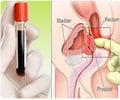A biomarker living next door to the KLK3 gene that can predict which GS7 prostate cancer patients will have a more aggressive form of cancer has been identified.

"This is the first report that I am aware of that indicates a genetic variant can stratify GS7 prostate cancer patients," said Jian Gu, Ph.D., associate professor at MD Anderson, and a key investigator on the study. "This is important because this group with heterogeneous prognosis is difficult to predict and there are no reliable biomarkers to stratify this group."
In this study, researchers investigated inherited genetic variants to see if there would be any promising biomarkers for prostate cancer patients. The investigators studied the genetic makeup of 72 SNPs identified from the genome-wide association studies (GWAS) in 1,827 prostate cancer patients. They analyzed associations of these SNPs with disease aggression, comparing them in clinically defined high and low aggressive cases. They found a SNP on the KLK3 gene that can predict an aggressive form of GS7 disease.
"Treatment options for the GS7 disease are controversial because the burden of combined treatment modalities may outweigh the potential benefit in some patients," said Xifeng Wu, M.D., Ph.D., professor and chair of Epidemiology, and lead investigator on the study. "It is critical that we develop personalized treatments based on additional biomarkers to stratify GS7 prostate cancers. Additional biomarkers may help us achieve personalized clinical management of low and intermediate risk prostate cancer patients." Wu also said her team are expanding the study and taking a pathway-based approach to systemically investigate genetic variants in microRNA regulatory pathways as biomarkers for the prognosis of prostate cancer patients. "We are also working on circulating biomarkers. Eventually, we will incorporate all biomarkers, epidemiological and clinical variants into nomograms to best predict the prognosis of prostate cancer patients at diagnosis."
Source-Eurekalert














